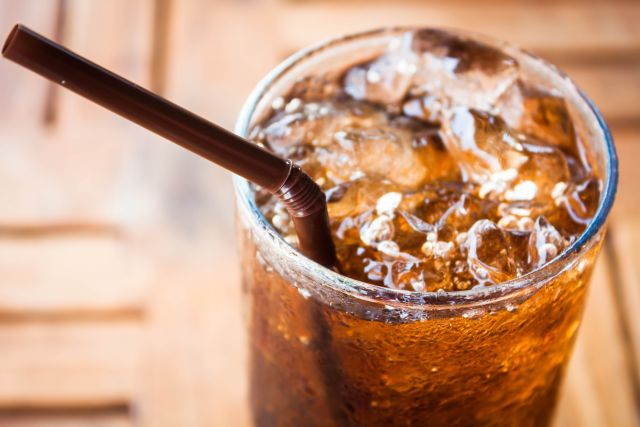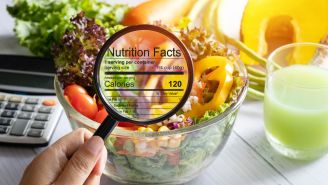Updated on July 14, 2023.
The artificial sweetener aspartame may possibly cause cancer, according to a report from the World Health Organization (WHO) released on July 14. The report was a joint effort between the International Agency for Research on Cancer (IARC, an independent research organization as well as cancer research agency within the WHO), and the Food and Agriculture Organization (FAO) Joint Expert Committee on Food Additives (JECFA).
The paper, which was published in The Lancet Oncology, classified aspartame in Group 2B (possibly carcinogenic to humans), based on “limited evidence,” specifically for a type of liver cancer called hepatocellular carcinoma.
The low-calorie sweetener is used widely as a sugar replacement in a variety of foods and beverages. It’s also found in some pharmaceuticals, such as vitamins and sugar-free cough drops, according to the Calorie Control Council. Introduced in the early 1980s, aspartame—whose brand names include NutraSweet® and Equal®—is now found in some 6,000 products globally, including popular diet sodas, chewing gums, frozen desserts, toothpaste, tabletop sweeteners, and other products.
It’s a decades-old debate
Concerns about the health effects of aspartame go back years. But studies about the role of aspartame in the development cancer—particularly some blood-related cancers like leukemia and lymphoma—have had inconsistent results. While some studies have suggested a link to cancer, others have failed to do so.
Aspartame has not been conclusively linked to specific health problems, except phenylketonuria (PKU), a rare genetic condition present at birth that affects the ability of the body to breakdown phenylalanine, an amino acid found in many foods as well as aspartame. In people with PKU, the buildup of phenylalanine can cause serious health problems including brain damage.
WHO last reviewed the safety of aspartame in 1981—a year after it was developed. In 2019, emerging results from studies in humans and lab animals prompted an advisory group to the IARC to recommend that aspartame be a high priority for an updated evaluation.
Two different WHO working groups made up of 25 scientists from 12 countries conducted separate reviews of aspartame. The groups looked at roughly 1,300 studies that evaluated aspartame as a potential carcinogen, including human epidemiology studies, animal lab experiments, and analyses of whether aspartame possesses any of the known characteristics of cancer-causing substances.
Still, the committees found “no sufficient reason” to change the acceptable daily intake of aspartame, which they reaffirmed at 40 mg/kg of body weight.
The U.S. Food and Drug Administration’s (FDA’s) daily limit, however, is slightly higher at 50 mg/kg of body weight. To reach that limit, a 132-pound person would need to drink 12 cans of diet soda per day. Since the actual amount of aspartame in diet soda is often three to six times less than the maximum permitted levels, that same 132-pound person would need to drink about 36 cans to reach that limit, according to the America Cancer Society (ACS). The FDA has stated that aspartame is “safe for the general population.”
In a response to the latest IARC findings, the FDA published a statement opposing the agency’s conclusion, pointing out that classifying aspartame as a possible carcinogen to humans “does not mean that aspartame is actually linked to cancer.” In 2021, FDA scientists reviewed the studies included in the IARC’s review, and found “significant shortcomings” in these studies, according to the July 14 statement.
“Aspartame is one of the most studied food additives in the human food supply. FDA scientists do not have safety concerns when aspartame is used under the approved conditions,” the FDA said.
What does this mean for consumers?
Research is ongoing, but people who consume aspartame well within the upper limit recommended by WHO and U.S. health officials may not have cause for alarm. It is a good idea, however, to consider your total daily intake and be mindful of how much you may be consuming from various foods and other products. Experts also caution against the use of aspartame as a sugar substitute for the specific purpose of weight-loss.
In a press briefing, Francesco Branca Director of the Department of Nutrition for Health and Development at WHO clarified that the report’s results do not indicate that occasionally eating aspartame is risky to most people. "We're not advising companies to withdraw products nor are we advising consumers to stop consuming altogether. We're just advising a bit of moderation."
In fact, the IARC report highlights the “limited evidence” about a possible role for aspartame in the development of cancer in humans, and emphasizes the need for more and better studies.
“The findings of limited evidence of carcinogenicity in humans and animals, and of limited mechanistic evidence on how carcinogenicity may occur, underscore the need for more research to refine our understanding on whether consumption of aspartame poses a carcinogenic hazard,” Mary Schubauer-Berigan, PhD, head of the IARC Monographs Programme, said in the press release.
Given the lack of consensus, the American Cancer Society (ACS) noted that it “supports the call from IARC and other organizations for more research on aspartame and other artificial sweeteners.”







